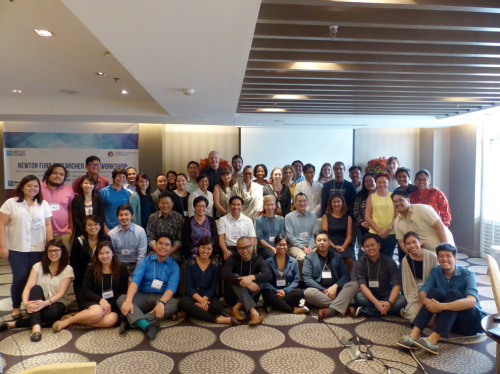
In January, we joined up with colleagues from the UK and the Philippines to attend a one-week, AHEALS and Newton Fund workshop in Manila, officially titled ‘Are Current Research Efforts on Kalusugan Pangkalahatan/Universal Health Care (UHC) in the Philippines Showing Evidence for Achieving the Goal? A Multidisciplinary Workshop for Early-Career Researchers’. Our aim was to review academic literature and policy documents to evaluate the Philippines’ implementation of universal health care. No easy task!
To prepare us for our week, all delegates had to review various articles and/or reports. In addition to several common group readings, our individuals readings included:
- Tobe, M. (2011) ‘Catastrophic out-of-pocket expenses for inpatient care among beneficiaries of the National Health Insurance Program in the Philippines’, Unpublished Thesis
- Reyes-Lao, I.M.L. (2013) ‘An Assessment of the Outpatient HIV/AIDS Treatment package provided by the Philippine Health Insurance Corporation’, Unpublished Report
- Acuin, JM, Marcelo, DB (2014) Evaluation of the functionality of the Health Care Delivery Referral System, De La Salle Health Sciences Institute, Philippines
In total there were around 30 delegates from the UK and the Philippines and we divided up into groups of 6 to set about understanding the healthcare system in the Philippines.
In brief, there are several challenges to implementing universal healthcare:
Firstly, the Philippines consist of over 7000 (!) islands with a population of over 93 million. Classified as a lower-middle income country, the majority – 54% – of healthcare costs are funded by out-of-pocket (OOP) payments. The reminder is made up of a system of national insurance (PhilHealth) and local discretionary funds. But the insurance system only applies to in-patient care as there is not really anything in place for primary care or mental healthcare (though some local areas may provide some discretionary funds).
Secondly, healthcare in the Philippines is decentralised, meaning that each local area decides how to spend their healthcare budgets, however budgets are not always assigned based upon regional need. This makes regulating healthcare costs and coverage very challenging.
Thirdly, whilst PhilHealth report that over 80% of Filipinos are covered by national insurance, the literature suggested that due to the difficult way of accounting for PhilHealth members (remember, 93 million people spread over 7000 islands!), this figure might be over estimated.
Fourthly, hospital costs, private and government sponsored, have historically been allowed to charge whatever fees for services they would like. More recently, 23 health conditions have been set at fee-based services (meaning there is a cap on how much hospitals can charge patients), but this does not stop other fees from rising, such as medications and treatments for other health conditions. In short, patients still have to pay a lot.
Our aim within all of this was not to provide any solutions. Rather, we wanted to help interested parties understand what the research suggests. We spent four days mapping out various aspects of healthcare, including service coverage, population coverage, financial risk protection, the patient journey in navigating the system and comparisons with other global counterparts. We then presented our findings as a group to an audience of about 200-people including the president of PhilHealth, representatives from the Ministry of Health, the private sector and the World Health Organisation. There is a huge desire and passion from those working within healthcare to address these difficulties and improve the daily life of Filipinos. Our hope is that by collaborating on future research projects, we can begin to make a real difference to make healthcare, including primary care and mental healthcare, an affordable reality for Filipinos.
With a special thanks to the Ateneo Medical School and medical school students for a well organised and wonderful week!
